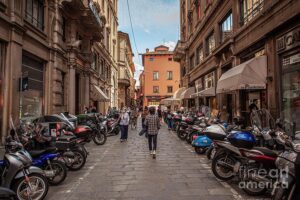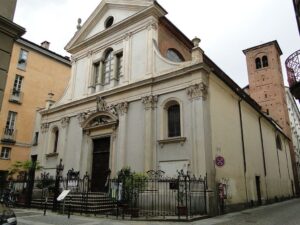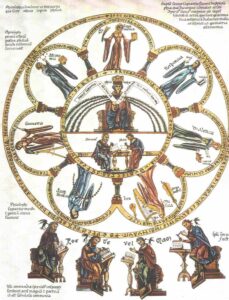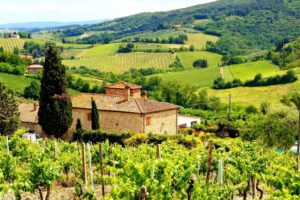In the past few weeks, the Jesuit Roundup has been working on several articles dedicated to the multitude of new teachers who have arrived at Jesuit Dallas. Filled with a passion to inspire a desire to learn in their students, these new teachers are working across all academic departments.
At Jesuit, the theology department is tasked with helping students to appreciate the way Christ works in his life, through friends, family, and others. The topics of theology topics every year vary from an analysis of scripture, church history, and discussions on morality or philosophy.
A new arrival to the theology department is Mr. Ismail Rodriguez, who is my Sacraments and Morality teacher for the 2022-2023 school year. Mr. Rodriguez and I discussed topics such as his experiences as a foreign exchange student, his faith and relationship with God, and what he looks forward to at Jesuit.

Mr. Rodriguez, are you originally from Dallas Texas?
Yes, I was born here, grew up here, and originally went to high school here. I left Dallas for college but most of my life has been spent here.
How was your high school experience?
It was awesome! I went to a Catholic school all my life, but I went to a high school that was nondenominational. So, my high school was kind of like Jesuit but without the Jesuit faith. I had a great experience because I was exposed to different people from all walks of life, but also challenging because it was the first time I had gotten out of the Catholic bubble. There were questions about whether Catholicism was true or not naturally came out of those conversations.
In that experience of “getting outside of the Catholic bubble,” did you also experience that in college?
Yeah definitely, especially in regards to academia nowadays, which doesn’t have a preference or concentration of philosophy and theology.
You’ve talked in class about doing study abroad programs, did you do these in college?
Actually no, I wish I had. That’s one of the reasons that propelled me to go to Rome later on in graduate school. That’s something I really should have taken advantage of, but I was always involved in language clubs and getting the most out of international students. That’s one of the reasons I decided to go to Rome to study.
What was one of the biggest culture shocks in Italy when you first arrived?
Academically, the style of teaching was all lecture based with just one oral exam at the end of the semester. Unlike at Jesuit, there are no grade checks every three weeks, so it really required the students to concentrate and not mess around. Not that students in America mess around, but in Italy, they require more of an act of the will and engagement of the mind in order to pass.
Socially and culturally, it’s more social in so far as you’re exposed to more people, for example, you walk everywhere, and you interact with people on a more person-to-person basis. The restaurant scenes, the cafes, the churches, and the museums are much more people based. Europe, especially Italy, relies less on technology, so there’s still that element of the natural order of socializing.

So was that your favorite part of Italy?
Initially, I went to Rome for a pilgrimage in 2017. Then, I officially moved to Rome in 2018, but I was just in love with Rome initially. There’s a saying that Rome is an open museum, because you have the history of the ancient Greco-Roman world, plus you have the history of Catholicism, so you have two in one. Rome was definitely my favorite city, but that’s not to say I didn’t enjoy other cities around Italy.
What other parts of Italy did you go to?
So I went to Palermo, on the island of Sicily in the south. I spent most of my time in the northern part of Italy in Florence, Milan, and Turin. The Tuscany region of Italy is really nice, I studied in Siena where I spent a whole summer learning Italian with a host family and with 1 on 1 tutoring for the first 3 months when I got there.
Was the language learning experience really intense?
Yeah because they told us to prepare to learn Italian because all of our classes would be Italian. But I thought “no I’ll just go with a clean slate,” and so I literally just arrived knowing how to say Buongiorno (good morning). I did that on purpose, and when I got there to Siena, the host mother picked me up from the parking lot. And from there, it was all Italian from there for three months, no English.
In the morning, we would have class in a group setting for four hours, then we would have lunch, and then we would have one on one tutoring in the afternoon. After all that we would go back to the host family and I would do a couple of exercises, playing soccer or going for a run, then I would eat dinner with the host family. That’s 8 hours daily of learning Italian, for three months.
What was the hardest part about learning Italian?
The hardest part for me personally was not confusing it with Spanish. Spanish and Italian are very similar, and they’re almost identical but there are a couple of nuances that throw you off. So in my mind, I was translating from Spanish to Italian, and that was difficult. But once I got through that hump I was able to distinguish both of them. I knew I was getting into being fluent in Italian when I started to dream in Italian.

Do you know any languages other than Spanish, English, or Italian?
I am fluent in French as well, which bears a lexical similarity to Spanish and Italian. My three non-English languages all happen to be Romance languages.
Which of those four languages is your favorite?
My native tongue is Spanish, but it’s hard. Spanish is my favorite, but I’m pretty biased. There’s a famous quote by Charles V that basically says “I speak Spanish to God, in reference to the doctrines of the Church and the creation of the spiritual exercises like St. Ignatius, French to my wife, Italian to my cooks, and German to my horse.” For him, Spanish was the ideal language and I feel the same way especially in my spiritual life because there are a lot of Spanish catholic writers, and it’s cool to read their teachings in their original language.
What of all those 4 languages was the most difficult to learn?
French, as it’s very similar to Spanish, Italian, and Portuguese. It’s also because we don’t have a large population of French speakers here.
When you were in Rome, how did that impact your faith life and spirituality?
You’re constantly running into priests and seminarians. In my class, 75-80% were religious so it was fun to talk to them and be exposed to them. Also in Rome, there are churches everywhere. You just pop in and see them, say a prayer and move on to the next one down the street. The Church really is prevalent, it’s really hard not to encounter the Church’s presence in Rome.

When you came back to the United States, what was the biggest culture shock you experienced?
Besides the language, I think it was the American work ethic. It’s something I didn’t realize too that extent until I came back. It’s very evident that Americans work very hard, which is a good thing, versus the Italian culture which is very leisure based.
What would you say are some of your favorite hobbies?
When you got back to Dallas, how long was it between getting back home and teaching as a Jesuit?
When I arrived in Dallas, I had three weeks. Specifically, I got two weeks off, and then a week of orientation. This gives me ample time to prepare for the school year.
Did you have any teaching experience prior to arriving at Jesuit?
Not formally, but I have taught in a number of school settings during my time in Rome, Italy.
How has your experience been so far?
Awesome, I really love academic settings and the environment of learning as well as intellectual curiosity. I especially like the small classes here at Jesuit and the fact that the students are all very well engaged in their classes. It really is a liberal arts-oriented school which I like.

What would you say is your teaching philosophy?
My teaching philosophy is doing my best to inspire students to critically think and to develop a lifelong pursuit of the intellectual life.

What do you look forward to the most about teaching in your first year at Jesuit?
I’m looking forward to working on my relationships with my students. I’m looking forward to learning the skill of imparting knowledge to my students whilst still doing it in a sound and manageable way for my students.
The last question is, do you plan on returning to Europe?
Most definitely! I’m getting married in June, and I met my fiancé in Rome, and we’re definitely going to go to Rome after we’re married not just for a honeymoon, but also to spend some time there. I have friends in Italy, and maybe we’ll stay there for a month or so. Way down the road, I was thinking about maybe living there in northern Italy, Spain, or France.

Conclusion
When I tracked down Mr. Rodriguez to his office to conduct the interview, I found him calmly sitting in his office chair reading “The Source of Catholic Dogma,” by Henry Denzinger. The sight of my religion teacher calmly sitting in his office, reading a treatise on Catholic theological doctrines brought great solace to me. His devotion to his faith and to teaching us is something that I greatly appreciate as a Catholic student.
I also feel that his experiences in Rome, the center of the Catholic world, would play out in the classroom with his spiritual experiences there. Having a teacher who can also speak a multitude of foreign languages is also interesting, as Mr. Rodriguez can help us directly translate Church texts written in Spanish or Latin.
Currently, Mr. Rodriguez teaches the junior class Sacraments and Morality and the senior level class Peace and Conflict. Sacraments and Morality, as the Jesuit Dallas course catalog puts it, “‘What Does It Mean To Live In the Image of God?’ This is the overarching question for students to consider in this course. Students understand the sacramental nature of the church.”
For Peace and Conflict, the goal of the course is to ” advance students’ study of social justice and Catholic Social Teaching (CST), with particular focus on the themes of peace and war. Students will orient their examination in the person of Jesus Christ and his call to peace and justice in the Gospels.”
I definitely look forward to the rest of the school year with him as my theology teacher, and I’m excited to have him at Jesuit. If you see Mr. Rodriguez, make sure to give him a warm welcome!
Stay tuned to The Roundup for more teacher profiles and school news!
